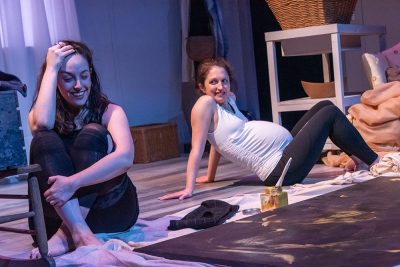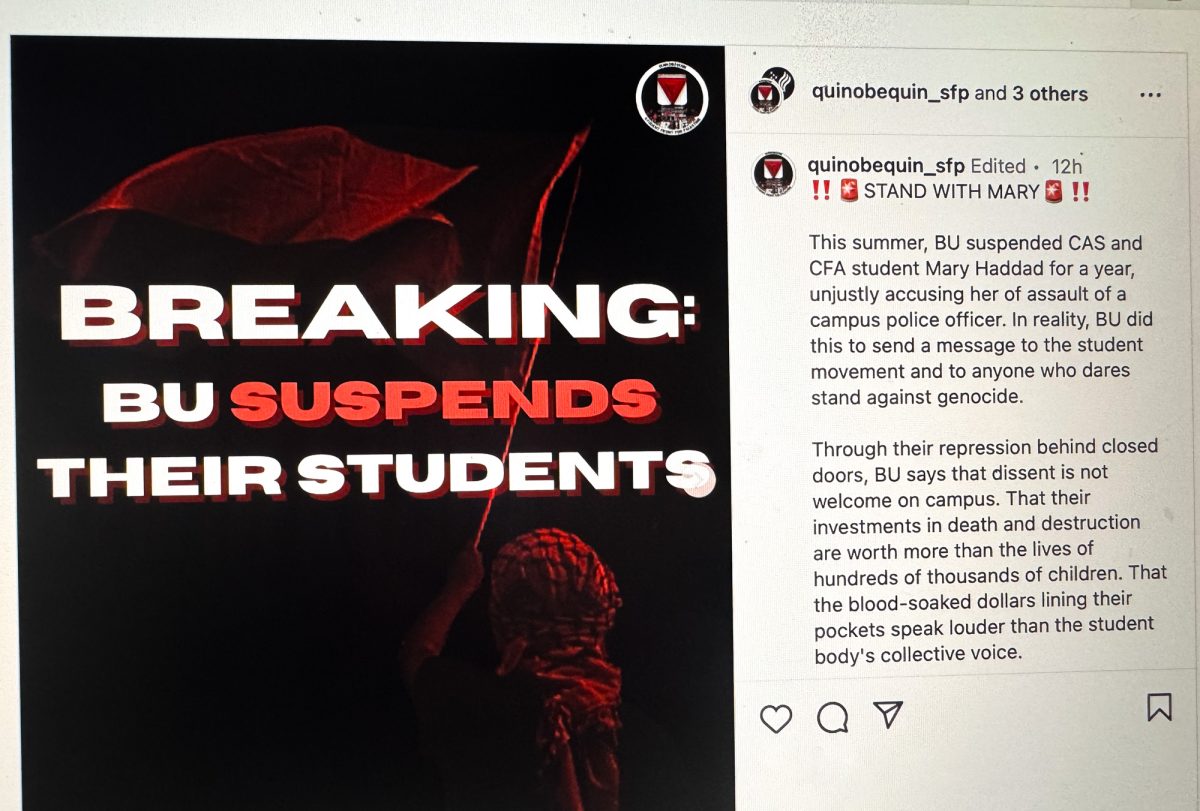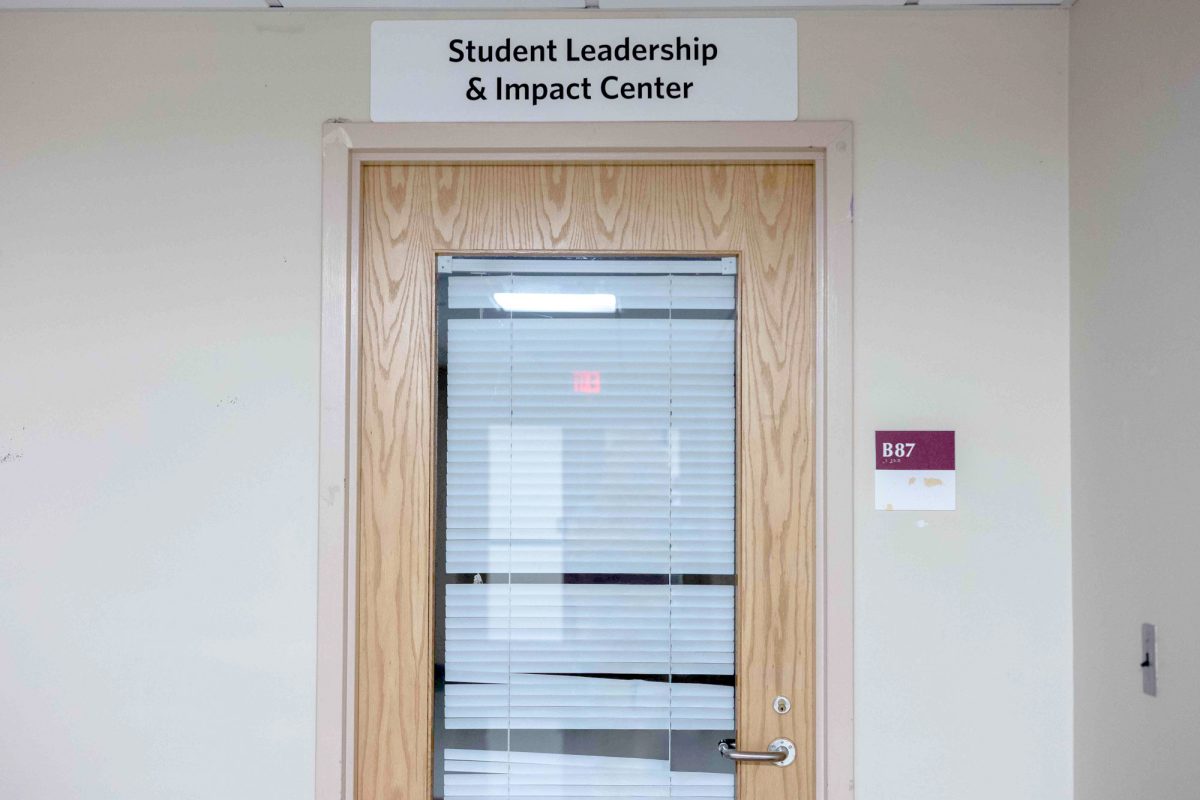In the 90 minutes the new drama “Beasts” takes to run, the audience experiences not just a play about two sisters and their tense relationship but also, as the characters reach their breaking points, a tree falls in the middle of their home.

“Beasts,” written by Cayenne Douglass, is running its first production at the Boston Playwrights’ Theatre from April 7 to 17 in collaboration with Boston University’s College of Fine Arts and its New Play Initiative.
The play revolves around Judy, an artist, who visits her domesticated, younger sister Fran, who is pregnant, while her husband is out of town. As the two spend time together, tension rises as secrets spill out, and Judy finds herself between Amelia, Fran’s doula, and her husband, Jim.
Katherine Schaber, the actor who plays Amelia and a senior in the CFA, said she remembered “being struck” by the relationship between the sisters and Amelia’s role in the conflict.
“[Amelia’s] energy just really brings out the contrast between the two sisters,” Schaber said. “As someone who is kind of growing into my womanhood, I would say it’s really interesting to be a part of a play that does expose those topics so vibrantly and honestly.”
The themes of motherhood and female relationships were something Caroline Calkins, who plays Fran, found satisfaction delving into, especially considering their rare portrayal on stage.
“I don’t think I’ve ever been to a play where it’s so predominantly women, like three women and one man, and I really found that refreshing,” Liza Foley, an audience member who also happened to be Calkin’s sister, said.
For a local production, “Beasts” came with its fair share of complexity, with Calkins embracing the “fun process” of putting together a new show that was being pieced together and worked on at the same time.
“It’s really sort of awakened my appetite for new plays again ‘cause I think it’s really exciting and so important to have spaces like Boston Playwrights’ Theatre where new work gets an opportunity to really get dug into,” Calkins said.
Schaber noted how working hand in hand with the playwright allows for the liberty for certain things to be adjusted while rehearsing.
“Nothing really beats having the playwright in the room with you… especially when it’s in service to how the actor is delivering a line,” Schaber said.“If the playwright hears it differently in that actor, I think that that’s like a really special thing. It’s like pieces of everyone’s contribution moves forward as the play does, which is really exciting.”
In a letter that appears in the show’s program, Douglass wrote, “I’m still very much in the process of figuring out what this play is and what it wants to be … I let the process with the director, actors, designers, audience, inform its rendering.”
Clara Francesca, who plays Judy, said the conversation around the “female obligation to be pregnant” drew her to the play. When it came to playing Judy, Francesca said they feel like they’re playing a “pastiche” of a lot of their friends and family members.
“I think Cayenne has so skillfully created characters that are both really archetypal, like they feel familiar, and they’re very specific,” Calkins said. “I think that’s a testament to good writing.”
Schaber also agreed with the strength of the play’s writing, noting how she too relates with its characters.
“I really think that there are aspects that [Amelia] sees in herself and in both of the sisters and alternatively as well, I see parts of myself in all three characters,” Schaber said.
Beyond just great writing, what makes “Beasts” special for Calkins is the community behind the play.
“I hope to always work on plays that are this juicy and have this support of a cast and of a crew and artistic design team,” Calkins said. “I think that’s really the greatest thing for me is to have that sort of community and to be working on a play that is so layered and so complex.”
With the help of fight choreographer Ryan Winkles, Francesca and Calkins were able to execute certain scenes and “release into those more heightened moments when the emotions are also really extreme” while also keeping each other safe, Calkins said.
Francesca said she tests a prop on stage before Calkins uses it — something she likens to what a sister would do.
Even with so much action and intricate pieces involved, Schaber said the rehearsing process was quick, taking less than just four weeks. Francesca credits Director Kelly Gavin for keeping the process moving.
“I felt that the structure was very sophistically strategic to ensure that by the time tech week came, we had everything in our body, even if there’s more room for us to discover things as artists in the space,” Francesca said.
Francesca said they hope that the audience is “hypnotize[d]” into being aware of their “conduct as they move through life.”
“I hope that this particular piece makes them consider binary problems and the nuances of pressure to procreate and the joys of procreating, both ends of that,” Francesca said.


























































































































